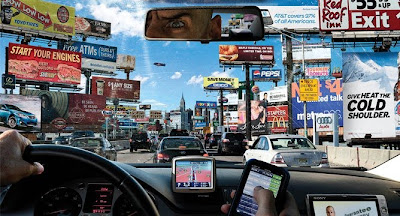hive mind links
 ---WikiRebels, the documentary and the first information war
---WikiRebels, the documentary and the first information war
“It might start to happen in the next decade or so,” Mr. Lanier writes. “Google and other companies are scanning library books into the cloud in a massive Manhattan Project of cultural digitization. What happens next is what’s important. If the books in the cloud are accessed via user interfaces that encourage mashups of fragments that obscure the context and authorship of each fragment, there will be only one book. This is what happens today with a lot of content; often you don’t know where a quoted fragment from a news story came from, who wrote a comment, or who shot a video.”
While this development might sound like a good thing for consumers — so much free stuff! — it makes it difficult for people to discern the source, point of view and spin factor of any particular fragment they happen across on the Web, while at the same time encouraging content producers, in Mr. Lanier’s words, “to treat the fruits of their intellects and imaginations as fragments to be given without pay to the hive mind.” A few lucky people, he notes, can benefit from the configuration of the new system, spinning their lives into “still-novel marketing” narratives, as in the case, say, of Diablo Cody, “who worked as a stripper, can blog and receive enough attention to get a book contract, and then have the opportunity to have her script made into a movie — in this case, the widely acclaimed ‘Juno.’ ” He fears, however, that “the vast majority of journalists, musicians, artists and filmmakers” are “staring into career oblivion because of our failed digital idealism.”
Paradoxically enough, the same old media that is being destroyed by the Net drives an astonishing amount of online chatter. “Comments about TV shows, major movies, commercial music releases, and video games must be responsible for almost as much bit traffic as porn,” Mr. Lanier observes. “There is certainly nothing wrong with that, but since the Web is killing the old media, we face a situation in which culture is effectively eating its own seed stock.”
In other passages in this provocative and sure-to-be-controversial book he goes even further, suggesting that “pop culture has entered into a nostalgic malaise,” that “online culture is dominated by trivial mashups of the culture that existed before the onset of mashups, and by fandom responding to the dwindling outposts of centralized mass media.”
Online culture, he goes on, “is a culture of reaction without action” and rationalizations that “we were entering a transitional lull before a creative storm” are just that — rationalizations. “The sad truth,” he concludes, “is that we were not passing through a momentary lull before a storm. We had instead entered a persistent somnolence, and I have come to believe that we will only escape it when we kill the hive.”

---The Cabinet of Dr. Caligari
---the cinetrix and Rich Girl cinema, Kuersten reacts with Rich Kid cinema
---financing films through Facebook
---cognitive prosthetics
---John Lahr's Elia Kazan profile
---Joel Bocko considers Chytilova's Daisies
---lastly, Charlie Stross' "Invaders from Mars":
"We are now living in a global state that has been structured for the benefit of non-human entities with non-human goals. They have enormous media reach, which they use to distract attention from threats to their own survival. They also have an enormous ability to support litigation against public participation, except in the very limited circumstances where such action is forbidden. Individual atomized humans are thus either co-opted by these entities (you can live very nicely as a CEO or a politician, as long as you don't bite the feeding hand) or steamrollered if they try to resist.
In short, we are living in the aftermath of an alien invasion."

Comments